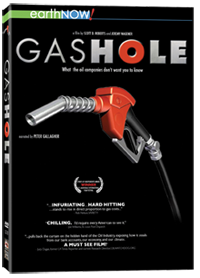"GasHole" insightful but leaky
DUANE DUDEK - Milwaukee Journal Sentinel film critic
With rising gas prices and layoffs at the GM plant in Janesville, "GasHole" is clearly a movie whose time has
come. And it has something for everyone, including those who find its assertions dubious.
But when the documentary is not chasing conspiracies like fireflies, asking leading questions or peppering its
narration with qualifiers like "maybe" and "if this was all true," it's offering infuriating insight into how we got to
this point, and a tantalizing glimpse of just maybe how we can get out.
And while one of the film's experts practically giggles that "no war is required" to develop alternative fuels and
technologies to break our dependence on foreign oil, "GasHole" shows that the opposite is true.
We have met the enemy, and it is the oil companies that reduce refining capacity to boost profit, an auto
industry that discourages mass transit, legislators who accept their campaign contributions - $100 million
since President Bush was elected nearly eight years ago - and, of course, us, consumers who have passively
tolerated all of this.
Until now. Gas prices are finally at a critical level. Can radical changes in government policy and consumer
behavior be far behind?
Jeremy Wagener and Scott D. Roberts produced, directed and are distributing the film around the country
one theater at a time - it is showing at 7 tonight only at the Oriental Theatre, 2230 N. Farwell Ave., with the
filmmakers scheduled to take part in a Q&A; session following the screening.
When Wagener and Roberts use hobbyists, inventors, a "former rocket scientist," actor Jonathan Jackson
and some guy who saw something 60 years ago as experts, "GasHole" wobbles. And there are sky-is-falling
references to vehicles getting up to 1,000 miles per gallon, patents to alternative-fuel vehicles being bought
and destroyed by the oil companies, and technologies "sophisticated enough to get him (their inventor) dead."
And it has the pastiche style of a work assembled from other sources, at the expense of original reporting.
But it is extremely persuasive when it exposes the hypocrisy of industry executives, and demonstrates
hydrogen and bio-fueled vehicles - although, curiously, GM's EV1 (subject of the documentary "Who Killed
the Electric Car?") is not mentioned. And the film's speculation about the growing demand for oil in
developing countries and how the world economy and social order depends on a finite natural resource found
in politically volatile regions is chilling.
E-mail: [email protected]


